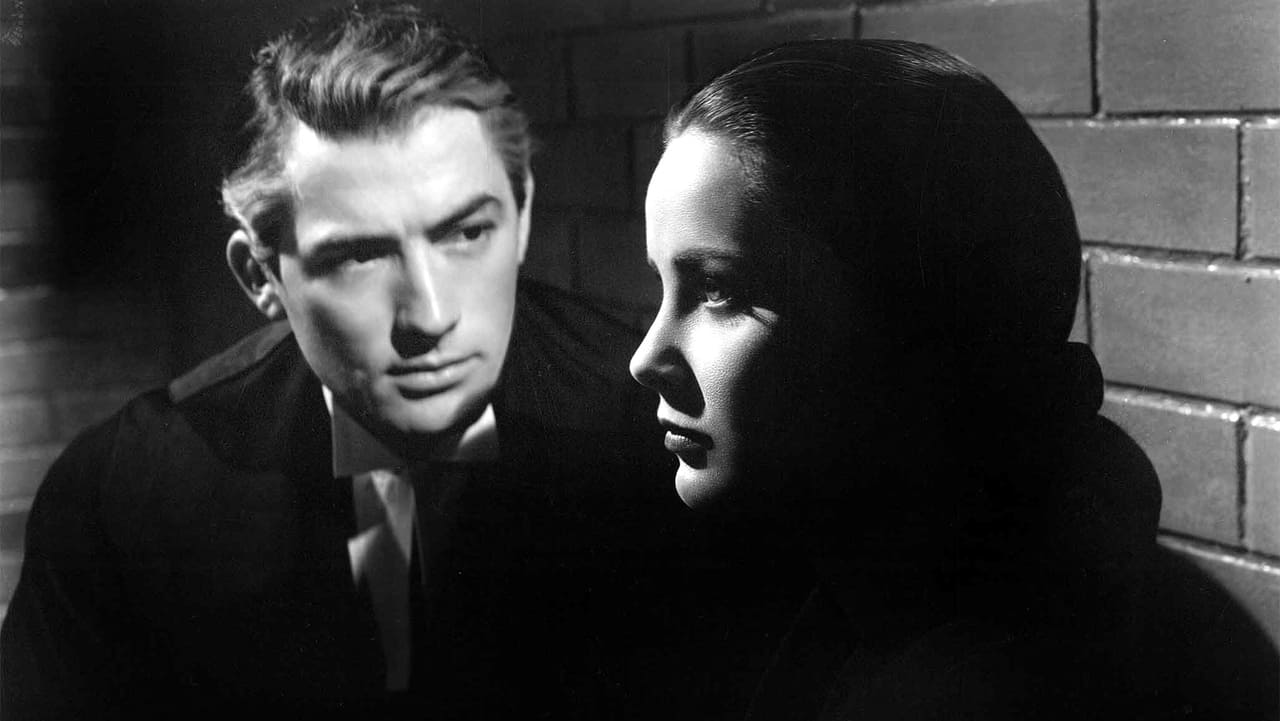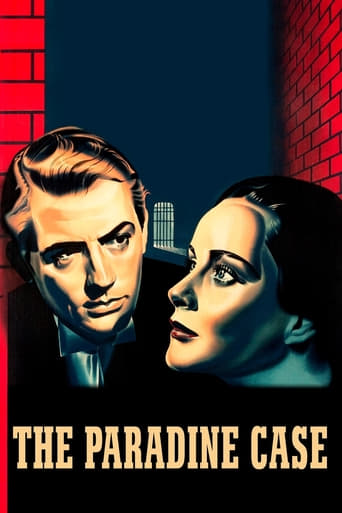Laikals
The greatest movie ever made..!
Sexylocher
Masterful Movie
Noelle
The movie is surprisingly subdued in its pacing, its characterizations, and its go-for-broke sensibilities.
HotToastyRag
Oh, Franz Waxman gets on my nerves. He just doesn't know when to quit! He wrote the start of a nice theme for The Paradine Case, but then his composition went crazy. Wall-to-wall music in every scene, notes constantly zigzagging up and down scales for no reason, and orchestrations that seem to want to drive the listener insane—Unfortunately, Franz Waxman's score was only the first of many problems with this movie.Fresh off his success in Alfred Hitchcock's Spellbound, Gregory Peck reunited with his director to play a British barrister hired to defend an accused murderess, but finds himself falling in love with her. Well, Greg was only 31 years old in 1947, so in order to convince the audience that he had decades of fantastic Atticus-Finch-esque experience in the courtroom, he was given extremely fake looking and distracting white shocks of hair near his temples. It was just as effective convincing the audience he was old as his unreliable accent convinced people he was British. I love Greg, but he just can't do accents very well.Despite all-star supporting cast of Charles Coburn, Charles Laughton, Ann Todd, Ethel Barrymore, Leo G. Carroll, and Louis Jourdan in his first American film, the movie was incredibly boring and redundant. I can't count how many times a character had reached his or her point in a monologue but kept talking for another three minutes anyway. It was obvious that either producer David O'Selznick or Alfred Hitchcock wanted Ingrid Bergman to play the accused murderess, but she must have been busy. They cast Valli, also in her first American film. She tried to come across as alluring and seductive, but really, the one expression she wore during the entire film was one of a model's pose. The entire time, she seemed to be silently asking, "Have you drawn my eyebrows on yet? Can I move?" The story is flat, the characters are annoying, the direction is slow, the music is infuriating, and the acting leaves much to be desired. Unless you love Louis Jourdan and want to see him with curly hair, save yourself two hours. Watch Spellbound and To Kill a Mockingbird for your Hitchcock and Gregory Peck lawyer fixes.
vincentlynch-moonoi
Before I get to the film itself, I want to speak about the new Kino-Lorber Blu-Ray edition (2017). This is the worst transfer to disc of any film I own in my approximately 500 title DVD/Blu-Ray library. I have homemade discs of old films taken off of television that are in better condition. While there are a few scenes (or I might more accurately say parts of scenes) where the transfer is decent, they are few and far between. At first I thought my Blu-Ray player was broken. But no. It's the transfer production. I won't say the film is unwatchable, but darned close. I will throw the disc away after tonight's viewing.But then again, there's not much to enjoy here. Hitchcock and Selznick. Just the thought of those two working together ought to guarantee a success. Bat alas, no.First of all some problems with the cast. Two great character actors -- Charles Coburn and Ethel Barrymore -- totally wasted here. Totally.On the other hand, Louis Jourdan turns in quite a good performance in his first American film.Gregory Peck is, to me, one of the finest American actors. Here he just seems okay. In fact, maybe that's the problem with this film. Much about it is just "okay". How can such a stellar cast and stellar director and producer come up with such a flat film?
chaswe-28402
Astonishing to read the criticisms this spellbinding narrative has attracted on this website. Selznick and Hitchcock couldn't get along ? Gregory Peck wanted to destroy this film ? It's talky ? These opinions, even if halfway true, are completely irrelevant, because of the film's compelling excellence I found it to be enthralling, fascinating and riveting from beginning to end. Gregory Peck is indeed often wooden in his other films. Not here. I consider this to be one of his very best performances: sensitive, engaging and totally convincing. All the performances are outstanding. The entire drama is superbly written and crafted. I was mesmerized, and followed the entire proceedings with rapt attention.Although most of this movie takes place in a courtroom exactly duplicating, at enormous expense, a courtroom in the Old Bailey, and purports to be a courtroom scenario, it is really an extremely complex three-cornered analysis of monogamous marriage, an ancient institution now in its early stages of disintegration. This analysis is of a geometric character, and it's small wonder that a chess set is featured, in an abandoned game between the two main observers of the unravelling drama. Three marriages are being dissected: firstly the miserable union between the sadistic, bullying judge played by Charles Laughton, and his put- upon, long-suffering wife, Ethel Barrymore; secondly the totally amoral wife, Baroness Alida Valli, more Austrian than Italian, with a murky past, and her murdered husband Colonel Paradine; and thirdly the susceptible barrister Gregory Peck and his faithful and adoring wife, Ann Todd. That's just the beginning. Several cast members have roaming eyes, and the judge also has wandering hands, setting up hostility between him and the barrister, who is infatuated by his patently guilty client, causing him to lose judgement and objectivity. The client herself evidently pants recklessly for her husband's valet, and it is suggested that the valet has a suppressed passion for his murdered master. I had to revisit the film in order to check up on this. It seems as though the valet was possibly bi-sexual, almost Wildean therefore, but had succumbed to the seductive mistress of the house. Since the book was penned by the scandalously successful, and prolific, turn of the 19th century author, Robert Hichens, any interpretation is possible.Watching this film a second time I was even more transfixed than before. It was supremely skilfully directed. Valli's self-inspection, both before and during her arrest, has been mentioned. Equally revealing is the manner of her entry into the courtroom at her trial. The verbal exchanges between Peck, Laughton, Leo Carroll, Jourdan and herself, during the trial, are intensely and continually absorbing. Anyone who has the slightest interest in the nature of passion, integrity, motivation and truth, can surely not fail to find the screenplay remarkably intriguing and perceptive. As mentioned, this must be Peck's most moving role, as he realizes the nature of his self-deception. Apparently, the singular merits of this production have yet to be generally discovered. Most people have no opinion at all, but simply adopt the opinions of others.
writers_reign
You'll go a long way - though you could make a detour toward Beat The Devil - to find a more disparate and mis-matched cast than this, some of whom - what the hell is someone with the stature of Ethel Barrymore, for example, doing in a supporting role that has absolutely no bearing on the main thrust of the story, other than to add gravitas to the marquee. You could argue that for Hitchcock the late forties/early fifties was his Sinatra period - after early stardom Sinatra hit the skids in the late forties reaching a low point with Double Dynamite and Hitch fared little better with turkeys like this and Under Capricorn in the same period. If you strip it to the bone it's a fairly simple story of a happily married man meeting and falling for a femme fatale and coming out of it badly but for God knows what reason we get a totally superfluous journey to Cumberland and the home life of the judge trying the case - the married man is a trial lawyer, the femme fatale the accused - merely to pad things out. Louis Jourdan, the epitome of the charming Frenchman, is reduced to sullen, wooden brooding and ... oh, why go on, suffice it to say steer well clear of this.

